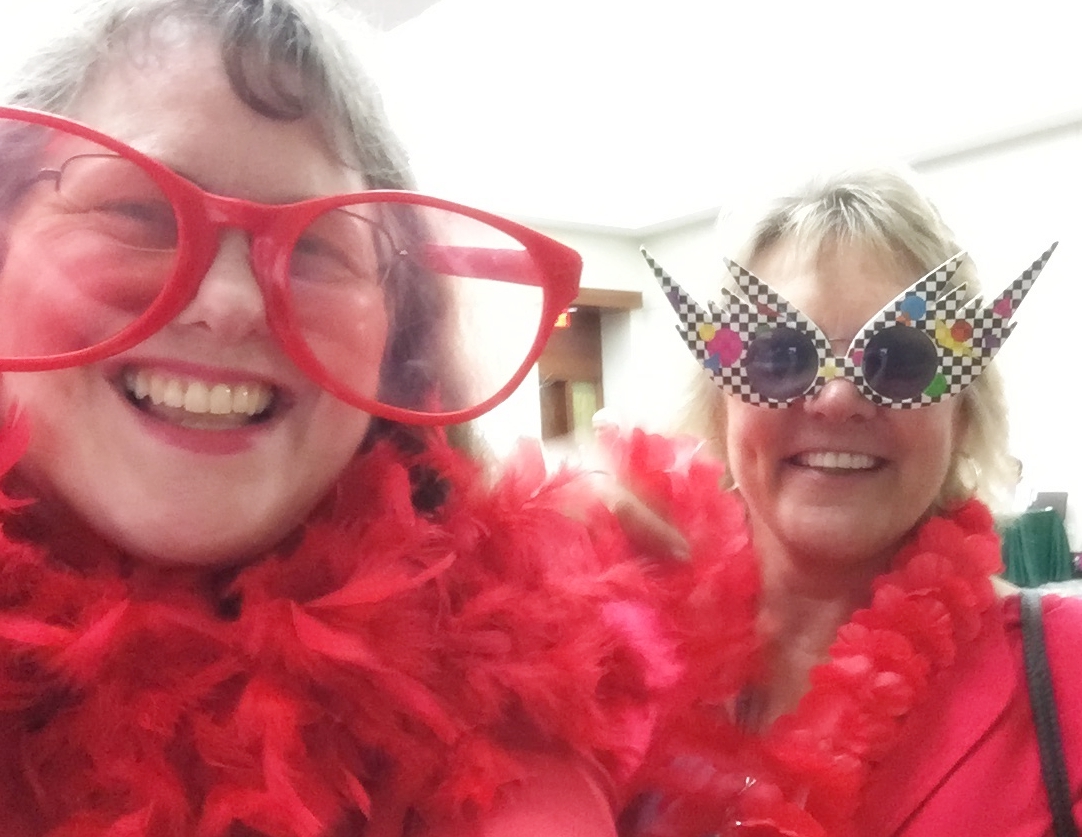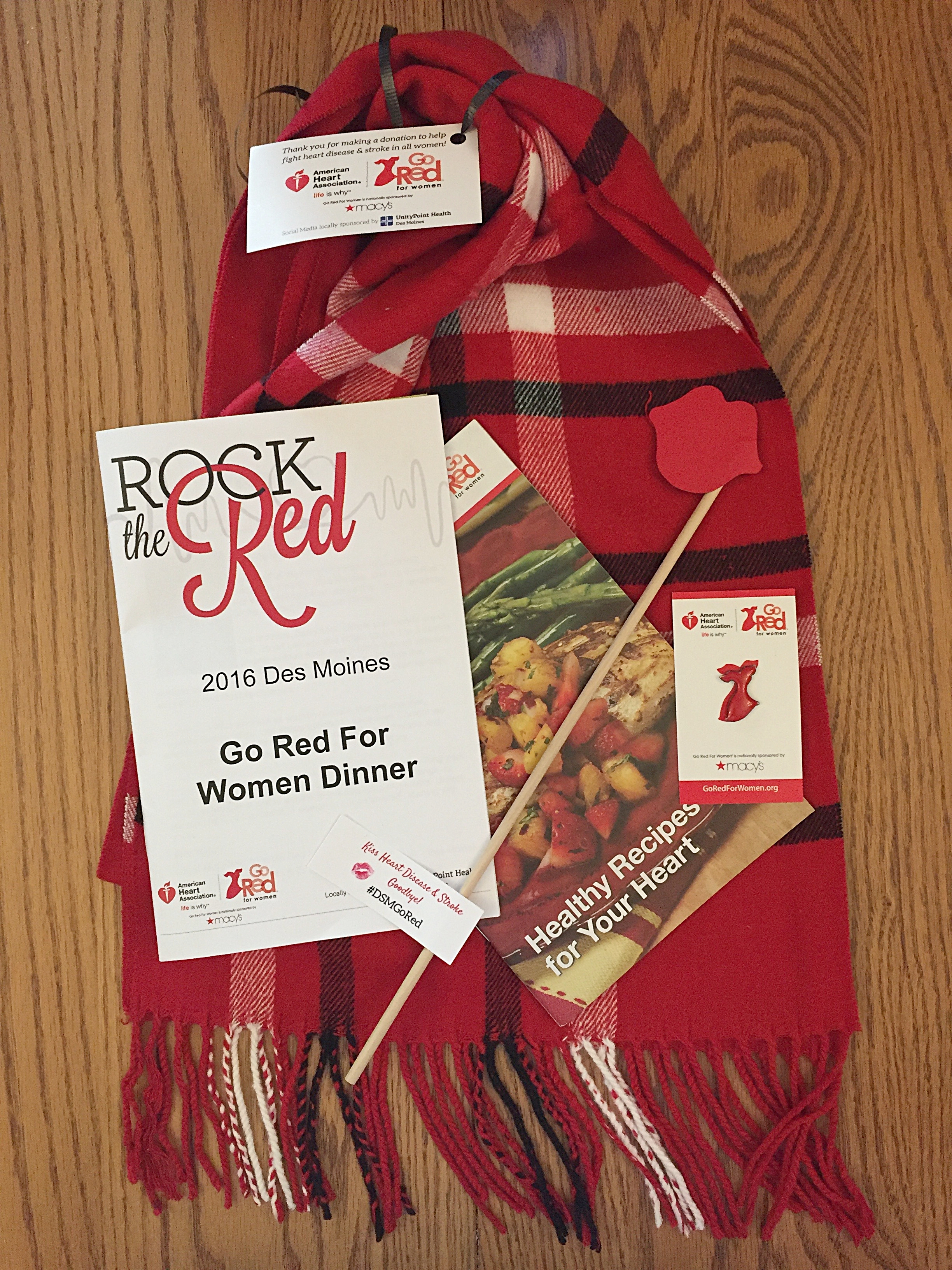I don’t usually attend fundraising events, but this past week I was invited to attend the Go Red for Women Dinner held at the Community Choice Credit Union Convention Center (otherwise known as the old Vets Auditorium building) in downtown Des Moines. Because my employer sponsored a table for up to 10 women, we were able to represent our company at this event that is dedicated to educating women of all ages about heart health. According to the Heart Foundation, heart disease causes one of every four U.S. deaths, making it the number one cause of death in our country. The dinner I attended was co-sponsored by the American Heart Association, UnityPoint Health-Des Moines, and the Go Red for Women Executive Leadership Team, but it was one of several just like it held at various locations throughout the U.S. Attendees are encouraged to learn about the risks of heart disease and stroke, become acquainted with warning signs, and know their numbers (for blood pressure, cholesterol, blood sugar and body mass index).
GoRed, I learned, is actually an acronym: G – Get your numbers (such as blood pressure, blood glucose levels, cholesterol, and weight). O – Own your lifestyle (by exercising, eating properly, and avoiding stress). R – Raise your voice (to promote heart health awareness). E – Educate your family (about how to eat healthy). D – Donate (to sponsor heart health education and research).

Do you know a woman who has heart disease, has suffered a stroke or heart attack, or is at risk? According to the American Heart Association, one in three women will suffer a heart event at some point in their lives. Within my immediate family, which has three women—my deceased mother, my younger sister and me—we fit that profile. My mother had at least one stroke, admitted to heart palpitations, and had a blocked carotid artery for which she underwent surgery. My mother was a slim woman, just five feet and two inches, but she was a heavy smoker most of her life, putting herself at risk for heart disease, lung disease and many other illnesses. When she began smoking in the 1950s, she said no one really talked about the long term effects of this habit. If she were still living today, my guess is that she would be a firm supporter of the Go Red Challenge, focused on encouraging women to develop the American Heart Association’s Life Simple 7 skills to lead healthier lives:
- Manage blood pressure. Keep it below 120/80 mm Hg.
- Control cholesterol. Keep total cholesterol under 200 mg/dl.
- Reduce blood sugar. For non-diabetic adults, keep below 100 mg/dl.
- Get active. Work on 150 minutes of moderate-intensity physical activity each week.
- Eat better. Eat lots of fruits and vegetables, limit sodium intake to less than 1,500 mg per day, and limit sugar-sweetened beverages to no more than 450 calories per week.
- Lose weight. Your body mass index should be less than 25 kg, although it is also affected by your age. A body mass index assessment tool can be found at MercyHealth at http://www.e-mercy.com/bmi-calculator.aspx.
- Stop smoking. As soon as you do, your risk of heart disease and stroke begin dropping.
The American Heart Association has an online assessment tool known as My Life Check where you can assess your own level of cardiac heath, determine your own health needs, commit to a lifestyle that improves your situation, and move closer to your goals. If you haven’t taken a good, hard look at your heart health beyond watching the numbers on your bathroom scale, this confidential assessment tool will provide a great starting point.
Greeting us at the Convention Center were some of the dresses featured at the Go Red for Women® Red Dress Collection 2016, presented by Macy’s to promote heart health. Since 2004, Macy’s has raised more than $55 million to fight heart disease. Iowa women at the Go Red for Women Dinner were encouraged to “Rock the Red†by also dressing in red. If you enjoy watching fashion shows, especially those sponsoring a cause and providing an education, you can see the full presentation at the Go Red for Women 2016 Red Dress Collection. A 30-second snapshot of the collection is shown below.
At the Go Red for Women Dinner, we learned that though women can be at risk for heart disease at any age, 80 percent of the factors that contribute to heart disease are controllable. Among these are stress and life balance. At a breakout session for de-stressing, we discussed how often stress is self-imposed. We set expectations for ourselves, for example, based on how we think others judge us, when in reality they are focused more on themselves. At another breakout session, focused on blending your life with work, we were encouraged to:
- Live in day tight compartments. (This refers to living in the moment.)
- Cooperate with the inevitable.
- Don’t worry about the past.
- Rest before you get tired.
- Do not imitate others.
- Put enthusiasm into your work.
- Do the very best you can.
- Count your blessings—not your troubles.

Perhaps most importantly, we learned the warning signs of an impending heart attack or stroke that are common for both men and women. These warnings can be remembered by an acronym, FAST, that represents the following:
- F – Face: Is it drooping?
- A – Arms: Can you raise both?
- S – Speech: Is it slurred or jumbled?
- T – Time: Call 9-1-1 right away.
The American Heart Association points out that it’s important to take action as soon as you notice heart attack or stroke symptoms. It’s better to call 9-1-1, for example, than to call a spouse, relative or friend, as this can delay treatment. Treatment given within three hours from the onset of symptoms, American Heart Association research shows, has the power to reduce long-term disabilities brought on by stroke. Here are some common signs of a heart attack or stroke, as described by the American Heart Association:
Signs of a heart attack:
- Chest discomfort—uncomfortable pressure, squeezing or pain in the center of your chest that lasts more than a few minutes, or goes away and comes back
- Discomfort in other areas of the upper body, such as one or both of your arms, the back, neck, jaw or stomach
- Shortness of breath, with or without chest discomfort
- Other signs such as breaking out in a cold sweat, or experiencing nausea or lightheadedness
Signs of a stroke:
- Sudden numbness or weakness of the face, arm or leg, especially on one side of the body
- Sudden confusion, trouble speaking or understanding
- Sudden trouble seeing in one or both eyes
- Sudden trouble walking, dizziness, loss of balance, or coordination
- Sudden severe headache with no known cause
You cannot attend an event like the Go Red for Women Dinner without picking up some heart-healthy recipes, so below are a few places where you’ll find recipes that were shared with us:
- American Heart Association Heart Healthy Recipes
- Go Red for Women Heart-Healthy Recipes
- National Pork Board Lean & Delicious Pork Recipes
- UnityPoint Health Recipes
No matter where you live, you can find activities that promote not only your own heart health, but also the lives of those around you. Consider teaming up with family members, friends or co-workers to participate in an organized walking or running challenge, or organize a walking, jogging, or running plan with a partner. In Des Moines, for example, the Iowa Food & Family Project is sponsoring The Next Step Challenge with Live Healthy Iowa just a few days from now, from September 12 to October 21. For a nominal fee of $10 for each participant, teams of 2-10 Iowans will compete in a Web-based competition, tracking the number of “steps†achieved each week. Each participant will receive a pedometer; weekly email motivational message; unlimited access to recipes, workouts and health information; a personal online tracking page, and a chance to win individual or team incentives and prizes. Sounds fun, doesn’t it?
I’m glad I had a chance to attend the Go Red for Women Dinner. Even if I never attend this event again, I have a better appreciation for heart health today than I did yesterday. Do you know your family’s heart history, especially with regard to the women? What are you doing to improve your own cardiac report card?

© 2016 Judy Nolan. All rights reserved.

Great information! Many of the controllable factors are so beneficial for preventing other diseases, too. While there is a significant history of heart troubles in the men on one side of my family, for women in my family there’s a history of breast cancer. According to my doctor, family history is only one part of the bigger picture and personal lifestyle choices make a big difference with breast cancer. I have to say, though, I really wish they’d change recommendations to look at body composition and actual fat percentage instead of just BMI! BMI isn’t a very accurate indicator for many athletes, especially weightlifters. I know plenty of people, myself included, who’ve been harassed by medical professionals who just looked at the scale instead of considering body composition!
Sounds like a fun and educational event! While my family is pretty lucky when it comes to heart disease, Jesse’s family is not! So I try to make healthy choices for the both of us.
What a great event! My family history is wrought with cardiac issues, and I have a congenital arrhythmia. My actual heart muscle is healthy, it’s just the electrical wiring is funky. I keep it under control with stress management and a low sugar diet.